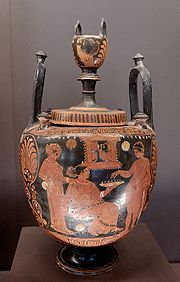
Lebes
Encyclopedia

Pottery of Ancient Greece
As the result of its relative durability, pottery is a large part of the archaeological record of Ancient Greece, and because there is so much of it it has exerted a disproportionately large influence on our understanding of Greek society...
, a deep bowl with a rounded bottom. It needed a stand
Stand
Stand may refer to:*Stand, Greater Manchester, a residential area in the Metropolitan Borough of Manchester, England*A partnership in cricket*STAND: A Student Anti-Genocide Coalition...
, frequently a sacrificial tripod
Sacrificial tripod
A sacrificial tripod was a type of altar used by the ancient Greeks. The most famous was the Delphic tripod, on which the Pythian priestess took her seat to deliver the oracles of the deity. The seat was formed by a circular slab on the top of the tripod, on which a branch of laurel was deposited...
, to remain upright. In classical times a foot was attached, and it was typically used as a mixing bowl in food preparation. One of the English translations of lebes is cauldron.
The lebes gamikos was a wedding bowl with looping handles; it is thought that it stood by the bride's door and may have been used in a purification ceremony.
A metal lebes, especially one made of bronze
Bronze
Bronze is a metal alloy consisting primarily of copper, usually with tin as the main additive. It is hard and brittle, and it was particularly significant in antiquity, so much so that the Bronze Age was named after the metal...
, was frequently given as a prize in athletic
Sport
A Sport is all forms of physical activity which, through casual or organised participation, aim to use, maintain or improve physical fitness and provide entertainment to participants. Sport may be competitive, where a winner or winners can be identified by objective means, and may require a degree...
contests and sometimes in dramatic competitions, as recorded by Herodotus
Herodotus
Herodotus was an ancient Greek historian who was born in Halicarnassus, Caria and lived in the 5th century BC . He has been called the "Father of History", and was the first historian known to collect his materials systematically, test their accuracy to a certain extent and arrange them in a...
:
Just as the Dorians of what is now the country of the 'Five CitiesPentapolisA pentapolis, from the Greek words , "five" and , "city" is a geographic and/or institutional grouping of five cities...
' — formerly the country of 'the Six CitiesDoric hexapolisThe Doric or Dorian Hexapolis was a federation of six cities of Dorian foundation, and included:*Kos, on the island of the same name in the Aegean sea;*Cnidus, in Caria;*Halicarnassus, also in Caria;*Lindus, on the island of Rhodes;...
' — forbid admitting any of the neighboring Dorians to the TriopianDatça PeninsulaThe Datça Peninsula is an 80 km-long, narrow peninsula in southwest Turkey separating the Gulf of Gökova to the north from the Gulf of Hisarönü to the south. The peninsula corresponds almost exactly to the administrative district of Datça, part of Muğla Province...
temple, and even barred from using it those of their own group who had broken the temple law. For long ago, in the games in honor of Triopian ApolloApolloApollo is one of the most important and complex of the Olympian deities in Greek and Roman mythology...
, they offered certain bronze tripodSacrificial tripodA sacrificial tripod was a type of altar used by the ancient Greeks. The most famous was the Delphic tripod, on which the Pythian priestess took her seat to deliver the oracles of the deity. The seat was formed by a circular slab on the top of the tripod, on which a branch of laurel was deposited...
s to the victors; and those who won these were not to carry them away from the temple but dedicate them there to the god. Now when a man of HalicarnassusHalicarnassusHalicarnassus was an ancient Greek city at the site of modern Bodrum in Turkey. It was located in southwest Caria on a picturesque, advantageous site on the Ceramic Gulf. The city was famous for the tomb of Mausolus, the origin of the word mausoleum, built between 353 BC and 350 BC, and...
called Agasicles won, he disregarded this law, and, carrying the tripod away, nailed it to the wall of his own house. For this offense the five cities — Lindus, Ialysus, Camirus, CosKosKos or Cos is a Greek island in the south Sporades group of the Dodecanese, next to the Gulf of Gökova/Cos. It measures by , and is from the coast of Bodrum, Turkey and the ancient region of Caria. Administratively the island forms a separate municipality within the Kos peripheral unit, which is...
, and Cnidus — forbade the sixth city — Halicarnassus — to share in the use of the temple. Such was the penalty imposed on the Halicarnassians.
Further reading
- Benton, Sylvia, "The Evolution of the Tripod-Lebes", The Annual of the British School at Athens, Vol. 35, (1934/1935), pp. 74–130.

